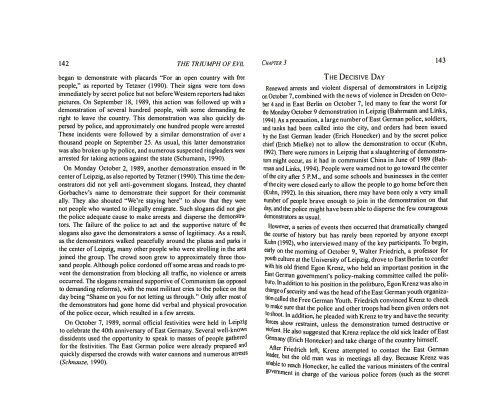austin-murphy-the-triumph-of-evil
austin-murphy-the-triumph-of-evil
austin-murphy-the-triumph-of-evil
Create successful ePaper yourself
Turn your PDF publications into a flip-book with our unique Google optimized e-Paper software.
142 THE TR IUMPH OF EVIL<br />
began to demonstrate with placards "For an open country with free<br />
people," as reported by Tetzner (1990). Their signs were tom down<br />
immediately by secret police but not before Western reporters had taken<br />
pictures. On September 18, 1989, this action was fo llowed up with a<br />
demonstration <strong>of</strong> several hundred people, with some demanding <strong>the</strong><br />
right to leave <strong>the</strong> country. This demonstration was also quickly dis·<br />
persed by police, and approximately one hundred people were arrested.<br />
These incidents were fo llowed by a similar demonstration <strong>of</strong> over a<br />
thousand people on September 25. As usual, this latter demonstration<br />
was also broken up by police, and numerous suspected ringleaders were<br />
arrested for taking actions against <strong>the</strong> state (Schumann, 1990).<br />
On Monday October 2, 1989, ano<strong>the</strong>r demonstration ensued in <strong>the</strong><br />
center <strong>of</strong> Leipzig, as also reported by Tetzner ( 1990). This time <strong>the</strong> dem·<br />
onstrators did not yell anti-government slogans. Instead, <strong>the</strong>y chanted<br />
Gorbachev's name to demonstrate <strong>the</strong>ir support for <strong>the</strong>ir communist<br />
ally. They also shouted "We're staying here" to show that <strong>the</strong>y were<br />
not people who wanted to illegally emigrate. Such slogans did not give<br />
<strong>the</strong> police adequate cause to make arrests and disperse <strong>the</strong> demonstra·<br />
tors. The failure <strong>of</strong> <strong>the</strong> police to act and <strong>the</strong> supportive nature <strong>of</strong> <strong>the</strong><br />
slogans also gave <strong>the</strong> demonstrators a sense <strong>of</strong> legitimacy. As a resu�t,<br />
as <strong>the</strong> demonstrators walked peacefully around <strong>the</strong> plazas and parks m<br />
<strong>the</strong> center <strong>of</strong> Leipzig, many o<strong>the</strong>r people who were strolling in <strong>the</strong> area<br />
joined <strong>the</strong> group. The crowd soon grew to approximately three thou·<br />
sand people. Although police cordoned <strong>of</strong>f some areas and roads to pre·<br />
vent <strong>the</strong> demonstration from blocking all traffic, no violence or arrests<br />
occurred. The slogans remained supportive <strong>of</strong> Communism (as opposed<br />
to demanding reforms), with <strong>the</strong> most militant cries to <strong>the</strong> police on that<br />
day being "Shame on you for not letting us through." Only after mos� <strong>of</strong><br />
<strong>the</strong> demonstrators had gone home did verbal and physical provocatiOn<br />
<strong>of</strong> <strong>the</strong> police occur, which resulted in a few arrests.<br />
On October 7, 1989, normal <strong>of</strong>ficial festivities were held in Leipzig<br />
to celebrate <strong>the</strong> 40th anniversary <strong>of</strong> East Germany. Several well-known<br />
dissidents used <strong>the</strong> opportunity to speak to masses <strong>of</strong> people ga<strong>the</strong>red<br />
fo r <strong>the</strong> fe stivities. The East German police were already prepared and<br />
quickly dispersed <strong>the</strong> crowds with water cannons and numerous arrests<br />
(Schnauze, 1990).<br />
CHAPTER 3<br />
THE DECISIVE DAY<br />
143<br />
Renewed arrests and violent dispersal <strong>of</strong> demonstrators in Leipzig<br />
on October 7, combined with <strong>the</strong> news <strong>of</strong> violence in Dresden on Octo<br />
ber 4 and in East Berlin on October 7, led many to fear <strong>the</strong> worst for<br />
<strong>the</strong> Monday October 9 demonstration in Leipzig (Bahrm� and L�ks,<br />
1994). As a precaution, a large number <strong>of</strong>East German pohce, soldters,<br />
and tanks had been called into <strong>the</strong> city, and orders had been issued<br />
by <strong>the</strong> East German leader (Erich Honecker) and by <strong>the</strong> secret police<br />
chief (Erich Mielke) not to allow <strong>the</strong> demonstration to occur (Kuhn,<br />
1992). There were rumors in Leipzig that a slaughtering <strong>of</strong> demonstra<br />
tors might occur, as it had in communist China in June <strong>of</strong> 1989 (Bah<br />
rman and Links, 1994). People were warned not to go toward <strong>the</strong> center<br />
<strong>of</strong> <strong>the</strong> city after 5 P.M., and some schools and businesses in <strong>the</strong> center<br />
<strong>of</strong> <strong>the</strong> city were closed early to allow <strong>the</strong> people to go home before <strong>the</strong>n<br />
(Kuhn, 1992). In this situation, <strong>the</strong>re may have been only a very small<br />
number <strong>of</strong> people brave enough to join in <strong>the</strong> demonstration on that<br />
day, and <strong>the</strong> police might have been able to disperse <strong>the</strong> few courageous<br />
demonstrators as usual.<br />
However, a series <strong>of</strong> events <strong>the</strong>n occurred that dramatically changed<br />
<strong>the</strong> course <strong>of</strong> history but has rarely been reported by anyone except<br />
Kuhn (1992), who interviewed many <strong>of</strong> <strong>the</strong> key participants. To begin,<br />
early on <strong>the</strong> morning <strong>of</strong> October 9, Walter Friedrich, a pr<strong>of</strong>essor for<br />
youth culture at <strong>the</strong> University <strong>of</strong> Leipzig, drove to East Berlin to confer<br />
with his old friend Egon Krenz, who held an important position in t�e<br />
East German government's policy-making committee called <strong>the</strong> poht<br />
buro. In addition to his position in <strong>the</strong> politburo, Egon Krenz was also in<br />
charge <strong>of</strong> security and was <strong>the</strong> head <strong>of</strong> <strong>the</strong> East German youth organization<br />
called <strong>the</strong> Free German Youth. Friedrich convinced Krenz to check<br />
to make sure that <strong>the</strong> police and o<strong>the</strong>r troops had been given orders not<br />
to shoot. In addition, he pleaded with Krenz to try and have <strong>the</strong> security<br />
f�rces show restraint, unless <strong>the</strong> demonstration turned destructiye or<br />
Vtolent. He also suggested that Krenz replace <strong>the</strong> old sick leader <strong>of</strong> East<br />
Gennany (Erich Honecker) and take charge <strong>of</strong> <strong>the</strong> country himself.<br />
After Friedrich left, Krenz attempted to contact <strong>the</strong> East German<br />
l eader, but <strong>the</strong> old man was in meetings all day. Because Krenz was<br />
unable to reach Honecker, he called <strong>the</strong> various ministers <strong>of</strong> <strong>the</strong> central<br />
government in charge <strong>of</strong> <strong>the</strong> various police forces (such as <strong>the</strong> secret


